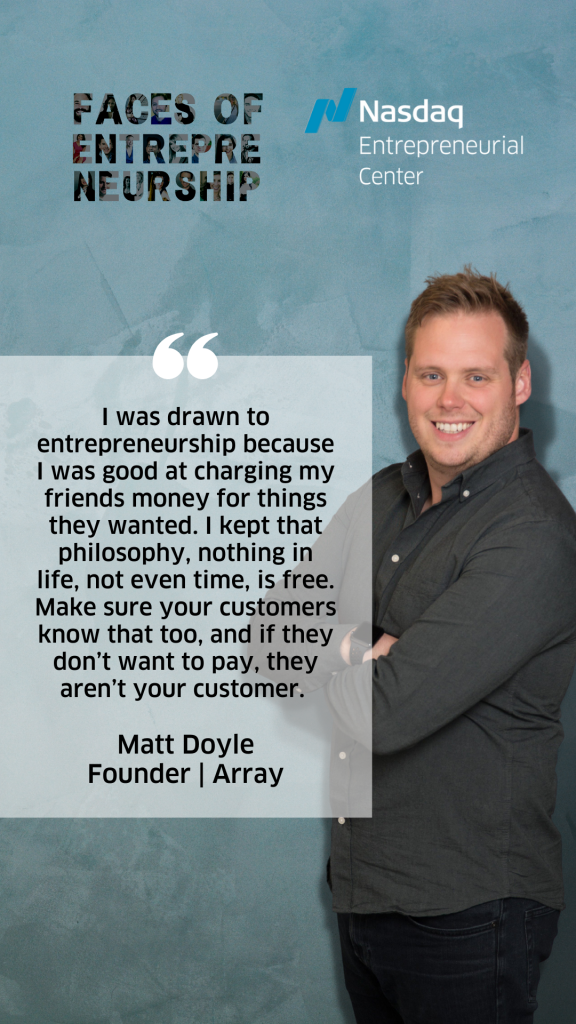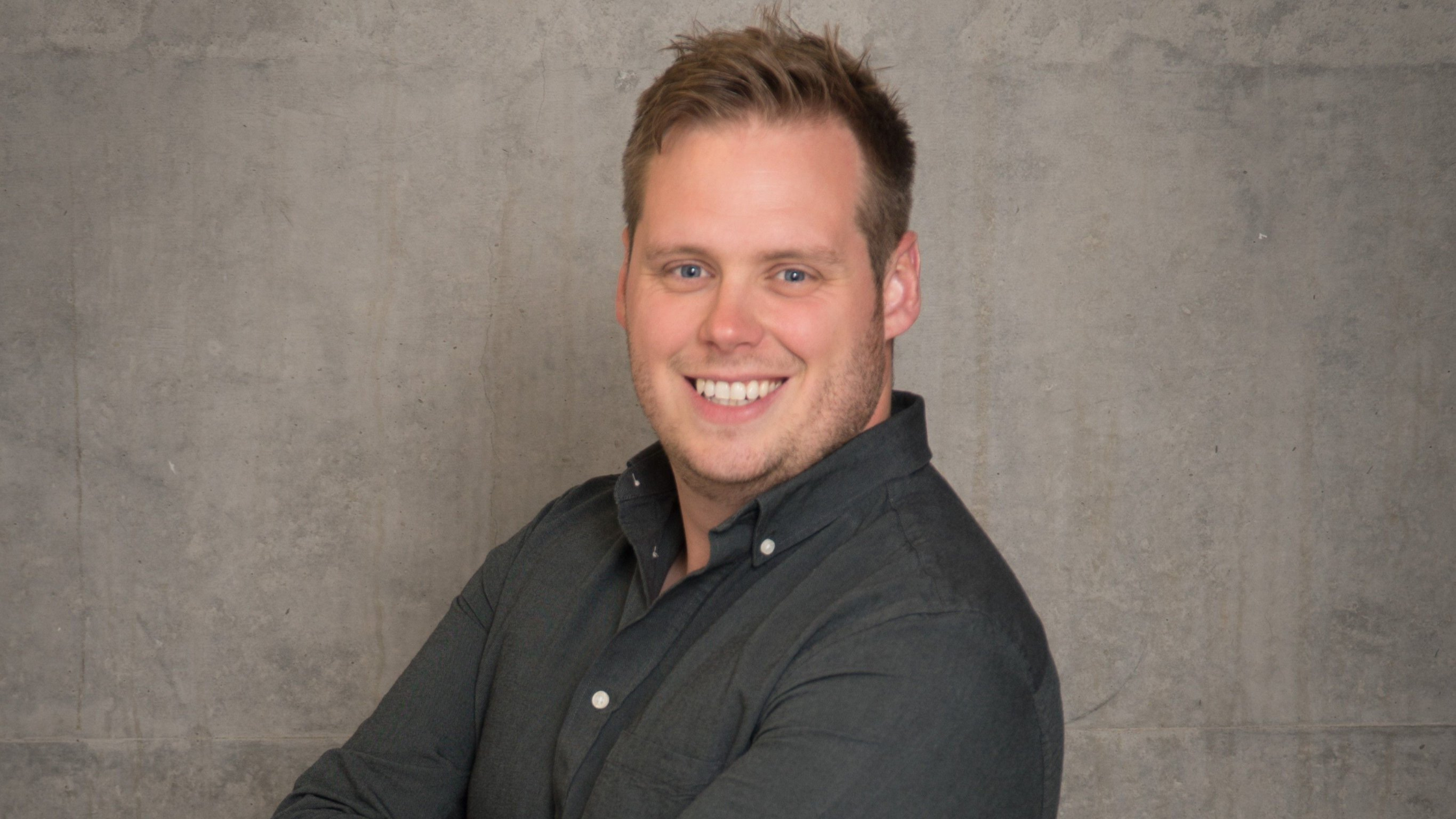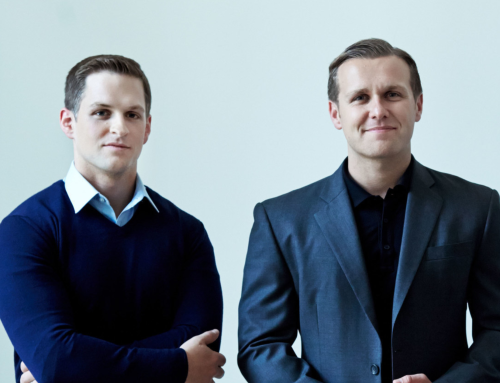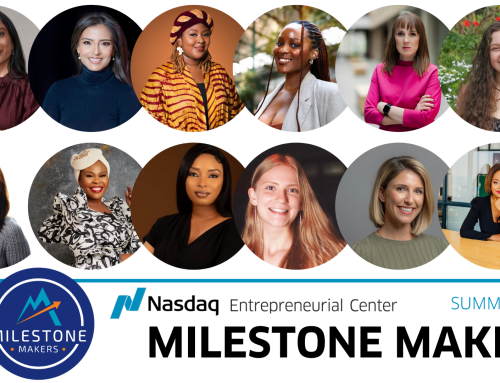Matt Doyle is the founder of Array, a suite of data collection and automation tools designed to connect field employees around the world to their home offices. Matt saw a need for no-code tools that empowered non-technical people to create highly technical processes and applications for their businesses without any formal coding knowledge. As a designer by trade, Matt wanted to develop a solution to automate data collection in a simple and intuitive way. Array was born, and three years later, Matt and his no-code platform are powering businesses around the world. Be sure to check out some of the classes Matt has led for the Center. The most recent is Entrepreneurs Guide to Endurance & Planning for the Future.
What does “entrepreneurship” mean to you?
 Matt Doyle: I would not pick any other lifestyle but that of an entrepreneur; even though it is stressful at times. For me, I love building and creating things that make people’s lives better and more enjoyable. I want to change the world for the better.
Matt Doyle: I would not pick any other lifestyle but that of an entrepreneur; even though it is stressful at times. For me, I love building and creating things that make people’s lives better and more enjoyable. I want to change the world for the better.
Tell us about your first experience with entrepreneurship.
MD: When I was 16 years old, I started a t-shirt company called Salvation Clothing. It was a skateboarding brand at first, and we went on to run live music events. I knew so little at the time, and I learned so, so much like building websites, printing and setting pricing.
What is your company’s origin story? What is the biggest reason you started your business?
MD: When I was working in field marketing, I first noticed the problem of collecting data and insights from the field. I saw companies spending months and thousands of dollars building apps that we unreliable and not at all flexible. It frustrated me, I needed to fix it.
I knew with my product and software experience I could solve this problem that, turns out, affects so many business across the world – like insurance, retail operations and energy.
What did those early days look like and teach you?
MD: Charge money for what you are making as soon as possible – it gives you some cash flow but also teaches you what the real customer value it. I always used to say, I was drawn to entrepreneurship because I was good at charging my friends money for things they wanted. I kept that philosophy, nothing in life, not even time, is free. Make sure your customers know that too, and if they don’t want to pay, they aren’t your customer.
What do you wish you knew when you started? Is there anything you would do differently?
MD: Running Array has been like a master’s degree in business for me so I don’t think I would change all that much. But I would have raised money sooner than we did. When we had capital, we grew so much quicker.
What does “success” look like for you? We’d love to hear your biggest, boldest dream?
MD: Success for me is if the companies I build can improve the lives of my customers, their families, and their communities. With this purpose driven approach, by following my passion, I hope I can inspire others to follow theirs as well. Whether that is me providing a solution to a customer that helps them save time to be with their families, or money to provide for them – success is when both of us do better.
What do you think will help you achieve it?
MD: We have always worked with the intern programs you run but we would like to do more to meet and talk with others looking to make a change.
What is your superpower as an entrepreneur? What is your proudest and darkest moment so far?
MD: My superpower is Dyslexia and the optimism that we can work it all out in the end. I consider Dyslexia a superpower because my brain is wired to look at things in a nonlinear way. I often find solutions other would not think of and I am able to visualize a complete solution very quickly.
Share a key high and a key low from your journey if you can.
MD: A high was when we first got into our own office space. It felt like a milestone, and it was my creative hub we could build the future in.
A low would be having to make tough finance decisions when having delays in funding rounds.
What are your personal driving principals, your top values?
MD: The passion to work on my passions – that way I never feel like I have a real job.
How have your personal principles and values shaped your company’s values and principles?
MD: Very much our culture is built on trust for one another to do our best work and always deliver. We can do this because we are all working on what we love, and we have respect for each other’s time and abilities.
We give our team the ability to work from anywhere in the world and take whatever time they need off. This is kept in check from knowing what they need to achieve based on our business strategy and planning. Because we have trust and respect this never delays projects or reduces output.
What’s it like to work alone or with your partners?
MD: As the founder, it can be very lonely, but I love the feeling that the team has my back and I can trust them to nail whatever I need their help with.
Do you have a mentor? Tell us about what makes them valuable to you and your business?
MD: I have had a number of mentors over the years. Some have been for a short time, and some have stayed around. The long-term value has been more around my growth as an entrepreneur.
What role does mentorship play in your world (as a mentor or mentee)?
MD: I find being a mentor has helped me define my understanding on some subjects and the problem-solving process not only helps the people I mentor but me as well.
Many entrepreneurs continue to perfect their daily routines to support their work and greater vision; would you mind sharing your morning routine or a regular ritual that grounds your work each day?
MD: I, like others, struggle with keeping a routine for different chapters of life.
Below is an example of my routine at its best.
- Get up 6am
- Go for a run
- Come home, get in my ice plunge tank
- Meditate 10/15 min
- Make notes for what would make the day go well and the rest of the week
- 9am Shower get ready get on first calls for the day
- Do my day, get home not too late, like 4pm, to finish off any work or calls
- 5pm Dinner with the family
- 6pm play with my kids
- 7pm-8pm put kids to bed
- Do something to chill out – play guitar, watch a show, play Xbox
- 10pm go to bed
Having young kids can make this vary day to day depending on dropping them at school or if I am traveling – something I am doing a lot right now.
What are you reading or have read?
MD: I am reading Measure What Matters by John Doerr and Life Force by Tony Robbins. I always recommend The Lean Startup and Crossing the Chasm.
Where do you go for inspiration?
MD: I am inspired by business and wellbeing leaders like Tony Robbins. But I find inspiration comes from spending time with nature – and time just thinking, not doing.
Do you have a favorite quote, mantra, or words of wisdom to get through the tough days?
MD: We have a saying at Array: “listen hard, change fast.” This is to help us focus on the customer and their real needs. But one I really love is “Shoot for the moon. Even if you miss, you’ll land among the stars.” – Norman Vincent Peale
What is a problem that keeps you up at night?
MD: Feeling like I did not have enough personal focus in the day or week
How do you think about helping others through your work?
MD: As above, I love giving others the opportunity to have a job they love. I like to help others grow by trying stuff they have not had the opportunity or confidence to do in the past.
What advice do you have for fellow (and aspiring) entrepreneurs building and leading teams?
MD: Find people who love what it is they do. I mean love, not like. People who can be your generals who you can trust with your life because your business is more than likely your life.
What kind of an entrepreneur do you want to be known as – as in, what do you want your legacy to be?
MD: Someone who supported and inspired others. I try to do this with my public speaking and creating companies worth working on.
Do you have someone you’d like to nominate to be profiled in our Faces of Entrepreneurship series? Please let us know by emailing media@thecenter.nasdaq.org or submit your nomination using this form.




Invite a Friend
Close